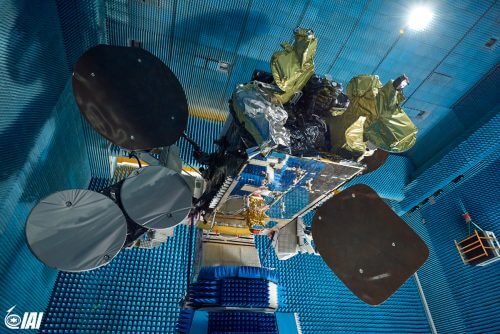Israel Aerospace Industries is examining the possibility of independently producing and operating a communication satellite for the Israeli government and other customers * Moshe Or-Tess, who was the vice president of Israel Aerospace Industries and initiated the Amos project, says that the establishment of a space company was intended solely for the marketing of Amos returnees, unfortunately after his retirement from Israel Aerospace Industries he was allowed to space to purchase satellites from other manufacturers

The Aerospace Industry is currently examining the possibility of independently producing, launching and operating a communication satellite, which will provide satellite communication services to government customers in Israel, and in addition to commercial customers in Israel and abroad.
This option for the aerospace industry's independent activity in the field of communication satellites is being examined after the company was surprised to receive the announcement from "Hell Communication" that it had chosen to produce its next communication satellite, Amos 8, with an American manufacturer. And this, after the loss of the Amos 6 satellite in an explosion that occurred due to the launch in Florida in September 2016. The satellite was one of the most advanced of its kind and weighed about 5.2 tons, and it contained an advanced communications antenna that operated in several frequency ranges.
The outline being examined, according to which the Aerospace Industry will act not only as the manufacturer of the satellite but also as its operator, will make it possible to make a wise use of the government budgets designated for this subject, in a way that will enable the preservation of the knowledge and capabilities of the State of Israel in this strategic field, while generating additional income for the Aerospace Industry, which is owned by the government full
The satellite is planned to be placed in sky point W4 which is Israel's national sky point, and the broadcasting rights in it belong to the State of Israel. The Aerospace Industry will apply to the Ministry of Communications for a license and frequency allocation for the use of this point in the sky.
Moshe Or-Tess, former CEO of Elta, and later: VP for research and development of the aerospace industry, and director of the electronics division (weapons and space systems electronics plants division), starting in 1983. He was one of the initiators of the Amos project in his position as the director of the division, saying in an interview to the website Hedaan that it is now possible to correct the history.
"As the one who initiated the establishment of the communication space company under the guidance of CEO Moshe Kerat, the idea was that this company would exclusively market Mashivi Amos in Israel and later also in the world market. I thought it would be better for a civilian company to engage in the marketing of a civilian satellite first and not the aerospace industry which was not sufficiently familiar with the civilian market. I also brought the idea to the board for approval. "
"When the idea of establishing a space communications company came up, my intention was unequivocal, that this company would exclusively market the Amos satellite", that is, not to market satellites from other parties" (as the company did with Amos 5 in Russia, Amos 17 in Boeing and Amos 8 in L'Oreal AB. )
"Unfortunately, the negotiations on the formal establishment of the company began after I retired from the aerospace industry, in August 1994. I do not know the wording of the agreement that allowed the space company permission to purchase satellites from other companies. Therefore, today the aviation industry would do well to establish its own marketing company and market its products."
"The aviation industry must take risks, but these are much smaller risks than we had when we built Amos 1 - then there were high technological and financial risks and other risks. The government must also understand the importance of space as a strategic field. The needs of the State of Israel will only increase. Today, most types of communication can be disrupted, but space communication will still (as long as a satellite war has not started) be difficult to disrupt. Many countries in the world are helping their industry to establish independent space capabilities, whether South Korea or even Egypt. It is a strategic infrastructure and in the space there is a synergy between military space and civilian space, every component can be used in both configurations."
Previous articles on the subject on the science website:
- Amos 8 will not be built in the aviation industry. Chalal Communications signed an agreement to purchase it from L'Oreal
- Over a year after the explosion of Amos 6 - there is still no agreed outline for the construction of Amos 8
- SpaceX will launch the two future communication space satellites
- Mabat Halal director: A foreign company will build Amos 8
- Space Communications ordered the "Amos 17" satellite from Boeing for $161 million
- The explosion of the Amos 6 satellite - initial reports immediately after the disaster
